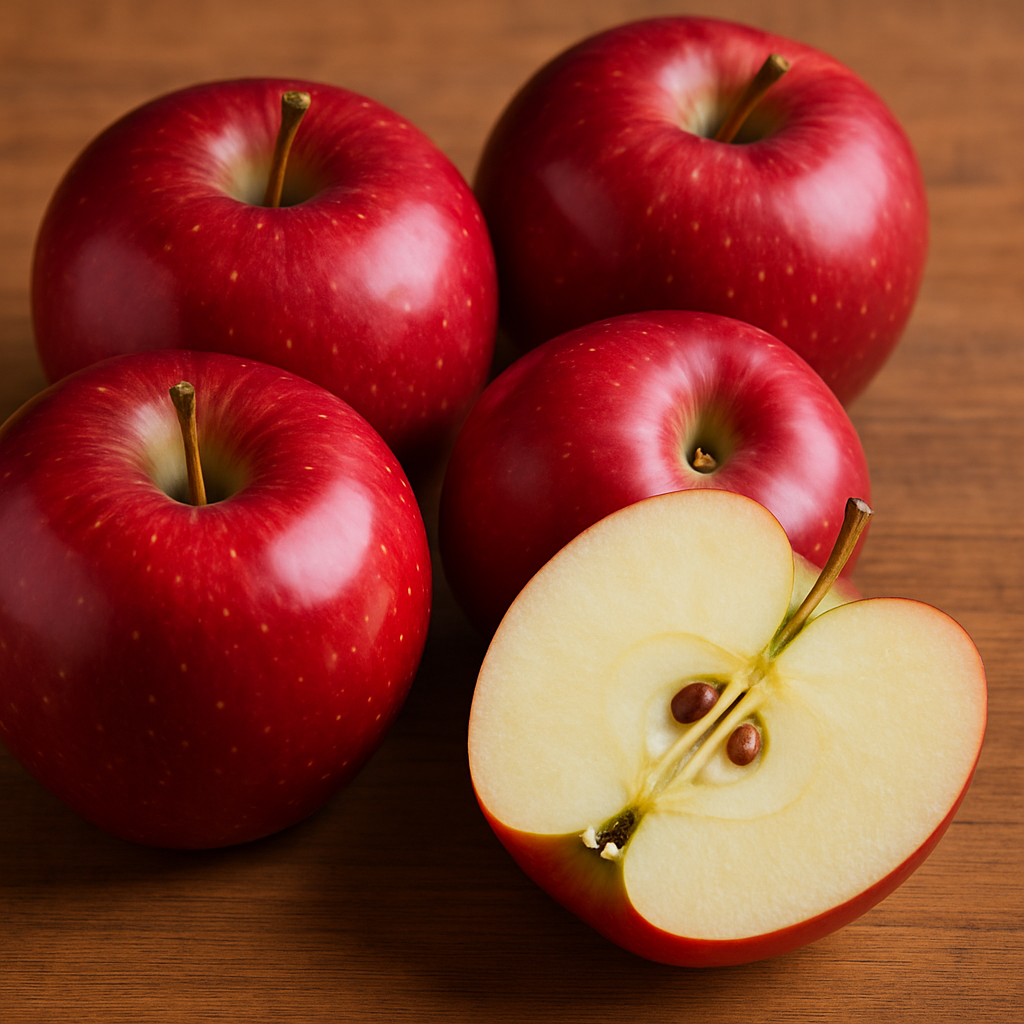Apples are among the most popular and widely consumed fruits in the world. Celebrated for their crisp texture, refreshing taste, and remarkable health benefits, apples have earned a reputation as a “superfruit.” The age-old saying, “An apple a day keeps the doctor away” is supported by modern research, which confirms that apples contribute significantly to overall health and disease prevention.
In this article, we will explore the nutritional profile, health benefits, varieties, global significance, and practical ways to include apples in your daily diet, all supported by scientific studies and expert recommendations.
The Importance of Apples in a Healthy Diet
Apples (Malus domestica) belong to the Rosaceae family and are cultivated worldwide, with thousands of varieties adapted to diverse climates. Global apple production exceeds 86 million tonnes annually, highlighting their role in daily diets across cultures.
Health organizations emphasize consuming at least 400 grams of fruits and vegetables per day to reduce the risk of chronic diseases such as cardiovascular disorders, type 2 diabetes, and certain cancers. Apples, with their rich nutrient profile, are an excellent and accessible choice to help meet this daily requirement.
Nutritional Profile of Apples
A medium-sized apple (200 g approx.) contains:
- Calories: 95
- Carbohydrates: 25 g
- Dietary Fiber: 4 g
- Vitamin C: 14% of Daily Value
- Potassium: 6% of Daily Value
- Vitamin K: 5% of Daily Value
- Water Content: ~86%
Most beneficial compounds, including antioxidants and fiber, are concentrated in the peel. Therefore, consuming apples with the peel—after thoroughly washing them—maximizes nutrition and minimizes pesticide exposure.
Health Benefits of Apples
1. Supports Heart Health
Apples are rich in soluble fiber, which lowers LDL (bad) cholesterol. Polyphenols in apples also improve vascular health and regulate blood pressure. Regular apple consumption is associated with a reduced risk of cardiovascular diseases, including stroke.
2. Aids in Weight Management
High fiber and water content make apples filling and satisfying. Eating one before meals can reduce overall calorie intake, supporting healthy weight management.
3. Promotes Digestive Health
Apples contain pectin, a prebiotic fiber that nourishes gut bacteria, supporting digestion and immune strength while reducing inflammation.
4. Regulates Blood Sugar
With a low glycemic index and polyphenols that improve insulin sensitivity, apples help lower the risk of type 2 diabetes.
5. Protects Brain Health
Antioxidants in apples protect neurons from oxidative stress, reducing the risk of Alzheimer’s and age-related cognitive decline.
6. Supports Bone Health
Flavonoids and antioxidants contribute to maintaining bone density and skeletal strength.
7. Potential Cancer Prevention
Research suggests that antioxidants in apples may reduce the risk of colorectal, breast, and lung cancers by neutralizing harmful free radicals.
Global and Cultural Significance of Apples
Apples are grown in over 80 countries, with top producers including China, the U.S., Poland, and India. Beyond nutrition, apples symbolize health, vitality, and knowledge in many cultures. Economically, apple farming sustains millions of livelihoods and contributes significantly to global agriculture.
Popular Apple Varieties
There are over 7,500 varieties globally, with these being the most common:
- Red Delicious – Sweet and widely eaten fresh.
- Granny Smith – Tart, perfect for baking.
- Fuji – Crisp, juicy, very sweet.
- Honeycrisp – Crunchy and balanced in flavor.
- Golden Delicious – Mild, versatile, good for desserts.
Incorporating Apples Into Your Diet
Apples are versatile and easy to use:
- Eat raw as a snack.
- Add slices to oatmeal, salads, or yogurt.
- Bake into pies, muffins, or crisps.
- Blend into smoothies or juices.
- Pair with nut butter for a balanced snack.
Risks and Considerations
- Pesticide Residue: Apples often rank high on the “Dirty Dozen” list. Washing thoroughly or buying organic reduces exposure.
- Allergic Reactions: Some people experience oral allergy syndrome, causing mild itching or tingling in the mouth.
Expert Recommendations
Health authorities recommend at least five servings of fruits and vegetables daily, with apples being an excellent choice. Eating apples with the peel maximizes fiber and antioxidant intake.
Apples Compared to Other Fruits
Apples stand out because they:
- Have a longer shelf life without refrigeration.
- Offer low-calorie, nutrient-rich benefits.
- Are versatile in both sweet and savory dishes.
FAQs About Apples
1. Are apples good for health?
Yes. Apples support heart health, digestion, blood sugar regulation, and brain function.
2. What is the best time to eat apples?
Anytime. Morning or mid-meal snacks are ideal for sustained energy.
3. Are apples good for weight loss?
Yes. Their fiber keeps you full, reducing overeating.
4. Should I eat apples with the peel?
Yes. Most fiber and antioxidants are in the peel.
5. How many apples should I eat daily?
One to two medium-sized apples are enough.
6. Are apples suitable for diabetics?
Yes, thanks to their low glycemic index and polyphenols.
7. Can apples improve skin health?
Yes. Vitamin C and antioxidants support collagen and skin repair.
8. Are apples safe for kids and elders?
Yes. Just ensure apples are cut into small, chewable pieces.
Conclusion
Apples are more than a delicious fruit—they are a nutritional powerhouse. From heart health and digestion to blood sugar regulation, brain protection, and even cancer prevention, the benefits are scientifically proven. Adding apples to your meals is simple, delicious, and highly rewarding. Whether raw, baked, or blended, they provide essential nutrients for long-term health and wellness.
References
- World Health Organization (WHO) – Healthy Diet Recommendations: https://www.who.int/news-room/fact-sheets/detail/healthy-diet
- Food and Agriculture Organization (FAO) – Apple Production Statistics: https://www.fao.org/faostat/en/#data/QC
- American Journal of Clinical Nutrition – Research on Apples and Cardiovascular Health: https://academic.oup.com/ajcn/
- National Institutes of Health (NIH) – Apple Antioxidants and Cancer Prevention: https://www.nih.gov/
- Harvard T.H. Chan School of Public Health – Nutritional Benefits of Apples: https://www.hsph.harvard.edu/nutritionsource/food-features/apples/





